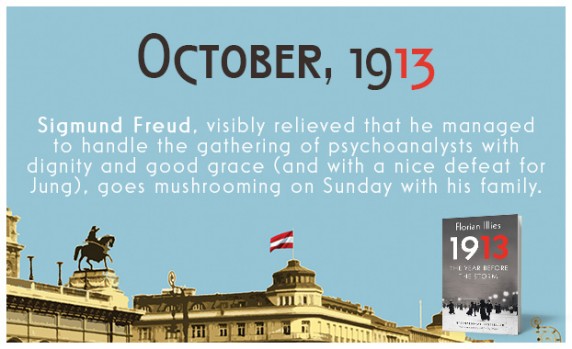October 17, 2013
This week in 1913: a zeppelin explodes, Rilke watches dancers, and Freud goes mushroom hunting
by Melville House
From now until the end of the year, we’ll be publishing weekly excerpts from 1913, which The Observer called “An absolute gem of a book.1913 was the year Henry Ford first put a conveyer belt in his car factory, and the year Louis Armstrong first picked up a trumpet. It was the year Charlie Chaplin signed his first movie contract, and Coco Chanel and Prada opened their first dress shops. It was the year Proust began his opus, Stravinsky wrote The Rite of Spring, and the first Armory Show in New York introduced the world to Picasso and the world of abstract art. It was the year the recreational drug now known as ecstasy was invented.
OCT. 14-20
Date unknown: Brief epilogue on the theme: “Love Comes and Love Goes”: In Hellerau, on 16 October, Rainer Maria Rilke has Émile Jacques-Dalcroze and his students dance for him once more, so that he may see exactly what their method of body activation involves. Sitting beside him in the otherwise empty festival theatre are Lou Andreas-Salomé, to his right, and Ellen Delp, to his left: that much-desired “matutinal Ellen” from Heiligendamm in August whom Lou refers to as her “chosen daughter.”
October 16: On 16 October, Ludwig Wittgenstein journeys with his friend David Pinsent by ship from England to Norway and continues to work on his Tractacus Logico-Philosophicus.
October 18: The military airship L2 explodes over Johannisthal, near Berlin, on its maiden voyage. Its thirty-man crew dies as the burning wreck crashes to the ground, sending a nearby pine forest up in flames, and the bodies of the soldiers on board are burned to a cinder. Their namesake, Count Zeppelin, writes to Great Admiral von Tirpitz that very same day: “Who could be more stricken or grieve more deeply with the Navy than I?”
After fifteen years of construction, the grandiose Monument to the Battle of the Nations is inaugurated in Leipzig on 18 October, in honor of the hundredth anniversary of the battle against Napoleon. Kaiser Wilhelm II pays tribute to the fighting spirit of the German people. The 91-meter-high monument, at a cost of 6 million Reichsmarks, commemorating the defeat of the French at the hands of the Prussians and their Russian and Austrian allies, was funded entirely from donations and lottery funding. The inauguration becomes a national, martial celebration with a grand parade. Dignitaries from the three victor countries lay down wreaths at the foot of the monument. Afterwards, there is a celebratory dinner in the Gewandhaus for 450 guests. No toast is made to freedom, only to the indestructible brotherhood of arms between Prussia and Austro-Hungary.
October 19: Freud and his family are drawn to the woods. The children slip into their dirndls and shorts, Freud into his lederhosen, his green jacket and the hat with the gamsbart, and then the hunt begins. Freud leads the mushroom hunters—and it is always he who, with his eagle eye, finds the best mushrooms in the most hidden of spots. He then takes a few steps forward, pulls off his hat, throws it over the mushroom and whistles shrilly through his silver pipe, bringing his fellow hunters storming out from the undergrowth. Then, once he has the whole family’s rapt attention, he finally lifts his hat and lets them admire the booty. Anna, his beloved daughter, is usually granted the honor of laying the mushroom in her basket.

